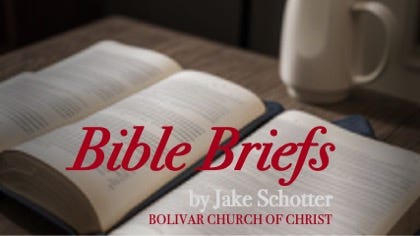Edges Honed, Hearts Settled: Reflections on Proverbs 27-29
June 19th – Bible Briefs by Jake Schotter
Edges Honed, Hearts Settled: Reflections on Proverbs 27-29
June 19th – Bible Briefs by Jake Schotter
Proverbs 27–29 closes by handing the listener a mirror. Solomon’s maxims examine the ordinary fields where godliness either flowers or wilts. These chapters show that fidelity to Yahweh must govern every social bond and economic venture, because only the fear of God can deliver us.
The first reflection concerns friendship. “Iron sharpens iron, so one man sharpens another” (27:17). Blades do not polish themselves; they submit to friction that grinds away dullness. So, the sage praises wounds that heal and warns against the sugary diplomacy of kisses that conceal malice (27:6). These verses sound abrasive in a culture that trades authenticity for affirmation clicks, yet their roughness is mercy. A believer who avoids honest reproof drifts toward self-deception, is like a sword left to rust in its sheath.
The mirror then moves from friendships to fields (27:23–24). Proverbs commended diligence and forbade presumption. The farmer counts his sheep because drought or disease can empty a pen overnight; the merchant reviews his accounts because “he who hastens to be rich will not go unpunished” (28:20). James hears the same heartbeat when he chastises merchants (James 4:13–15). Neglect of prudent planning is sloth, but frenzied hoarding is unbelief. Only when future income rests in Providence can present generosity flow without grudging fear.
Solomon next shines the light on leadership (29:2). Throughout chapters 28–29, the yardstick of a ruler’s legitimacy is justice for the vulnerable. A self-indulgent prince “lacks discernment” (28:16) and a king who judges the poor with truth finds his throne established (29:14). These verses unmask the lie that private vice is harmless if public policy thrives. Character is destiny for households, corporations, and nations alike. Under the gospel, authority is stewardship, not entitlement, for “the judge of all the earth” audits every signature and decree.
Yet even sturdy friendships, prudent budgets, and principled policies can crumble under social pressure. So Proverbs concludes by isolating the root disease (29:25). Fear of man morphs into flattery (29:5), deceit (29:13), and tyranny (28:15). Fear of Yahweh, by contrast, yields moral clarity (29:18). A proper vision grasps God’s authoritative word that tethers conscience to heaven when crowds or courts threaten.
United to Him, believers are liberated from the snare of human opinion; they can speak truth in boardrooms, refuse dishonest gain, and discipline children “while there is hope” (19:18) without capitulating to cultural scorn. Of course, the mirror also reveals grime. Tongues boast beyond tomorrow (27:1–2), eyes never tire of coveting (27:20), and greed hastens our steps (28:22). The summons to fidelity is also an invitation to reliance (28:13). Invite friends to sharpen your edge. Audit your flocks, budgets, and ambitions in the light of divine sovereignty without regret.



